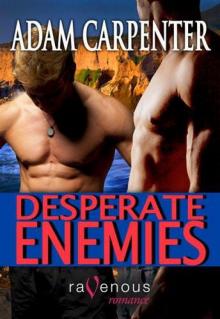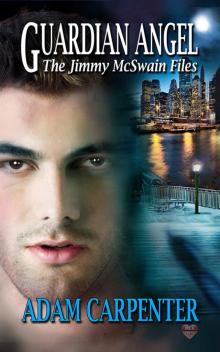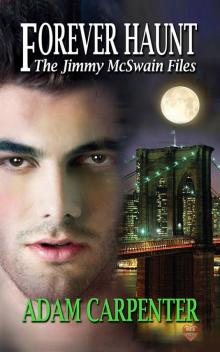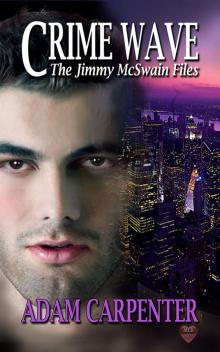- Home
- Adam Carpenter
Stage Fright Page 2
Stage Fright Read online
Page 2
“Have there been any other messages?”
“No.”
“Mysterious phone calls? Stalker behavior?”
Welly shook his head. “No. Not that I’m aware of.”
“So I’m guessing you want to hire me to investigate who sent this, and why?”
“Indeed. The case, as you say, seems cut and dry.”
“Why me? Have you notified the police?”
The moneyed T. Wellington Calloway scoffed at the idea. Jimmy didn’t blame him. First of all, no actual crime had been committed, and second of all, the police didn’t act upon anything until idle threats became tangible evidence. In other words, the cops needed a body before they got involved. Jimmy knew the routine all too well. Even then their involvement didn’t guarantee success.
Jimmy knew that all too well, also.
Welly continued, his blank, hazel eyes cautiously looking around to ensure they were not being observed. Mysterious notes create paranoia. “We—myself, the other producers backing the show, Casey himself, too—would like to keep this, uh, hiccup as quiet as possible. The last thing we need is to upset the cast and crew as we wrap up rehearsals and prepare for our first preview. Sometimes bad publicity is just that—bad.”
“How do you propose I do my job, ask questions of everyone, and not give people reason to worry about their own safety? Just who knows about this note?”
“No one in the cast,” he said.
“Unless someone in the cast sent it.”
“Jimmy, we are producing a psychological thriller. The drama is on the stage.”
“For now,” Jimmy said.
“You were a sweet boy. You sound cynical now.”
“Cynicism buys results. It keeps you from accepting people at their word,” he said. “Okay, Welly, how do we explain my presence at the theatre? Of course the house staff and crew know me as Maggie’s son, a substitute usher when she’s in a pinch. But they also know I’m a private investigator and when I’m not handing out Playbills to patrons, they might get suspicious.”
“Already thought of that. Officially, Jimmy, you are joining the company as a security guard. Theatres all over Broadway do it, both front of the house and backstage. You’ll have full access to the theatre.” He paused, his tone shifting. “Jimmy, I’d consider this is a personal favor to me. The McSwain family has such a long history with the Calloway Theatre. Maggie runs a tight ship in the front of the house, just as she has for twenty years. It gives me great pleasure in having seen you grow into a responsible, dedicated man. You have a rare quality Jimmy: honor. Which is why I am entrusting the safety of everyone associated with T13 to you. Casey’s safety, primary among them. A lot is riding on this new show, reputations, money, you name it.”
“Just so we’re clear, you’re hiring me for two reasons. Keep the playwright safe, all while I investigate who might have sent this note.”
“Casey will tell you more. He’s waiting for you back at the theatre. Listen to him, please, no matter how…unique he may be. Writers are like that, quirky and distant. I don’t have to tell you how vital he is to the show’s success, since he may need to rewrite certain scenes based on our audience response during the early previews. He needs to keep his head on straight and this kind of distraction won’t do. Jimmy, we have exactly a month to get things squared away,” he said. “Opening Night is set for October 13th.”
“You’re taking a chance, aren’t you?”
“What do you mean?”
“As your title suggests, there are people out there who fear the number thirteen,” he said. “You’re almost embracing the idea.”
“It’s a play about phobias,” Welly said. “And our mysterious letter writer has found ours.”
“Which is what?”
“Fear of failure.”
Jimmy nodded, considered what was at stake. A show, not a life. Interesting.
That’s when Jimmy McSwain finally put the envelope in his pocket. He took a sip of his coffee. It was cold.
§ § §
As Welly stated, the McSwains didn’t lack for a personal connection to the landmark Calloway Theatre, having opened and closed many shows over the years; but for Jimmy, tackling this case represented a new experience. He was a true insider now, part of the production, so much so he might as well start checking the weekly grosses on Playbill.com. Every Monday.
New York’s close-knit theatre community was known as much for its mega-musicals and star-driven plays as for its backstage drama and back-stabbing ways. So many of the artists, from the high-and-mighty producers, to the tortured playwrights and over-rated directors, the powerful stagehands, all the way to the lowly, but all-seeing ushers and bartenders—everyone seemed to take pleasure in the abject failure of a production that never should have left its try-out in Peoria. Of course everyone loved a hit, too, as long as it was theirs.
So one could imagine the vitriol being spewed about a show that dared to open cold.
The new American play, Triskaidekaphobia, had two obstacles standing in the way of success: it was making its World Premiere on Broadway, an unknown quantity, and conventional wisdom suggested you just didn’t do that. Then there was that awful title. Jimmy had to wonder what the producers were thinking. Or for that matter, the bold writer who was, perhaps as a result of deliberately invoking fear, on the receiving end of a possible death threat. Was Casey Crais trying to sabotage his own material with an ostentatious, obscure title? Jimmy had been around the theatre district his entire life, growing up in nearby Hell’s Kitchen, and so he had learned how cutthroat a business it could be. For all he had learned about T13, the creative team seemed to be doing the opposite of what you should do when opening a show. Shows should have simple titles. Look how long Cats ran.
But none of that was Jimmy’s concern, not after his meeting with Welly Calloway. As he stood beneath the marquee of the theatre, he awaited the arrival of his next appointment. Welly had said to meet Casey here at one, and by Jimmy’s watch, the playwright was twenty minutes late. So he spent the time looking at the signs and placards which had been put up behind the glass cases on the front of the building. At least the play had an intriguing tagline: WHAT ARE YOU AFRAID OF? Not unlike the message sent to the playwright. The big letters were stylized, painted in red, the question mark a splotch meant to indicate violence. In fact, the entire façade of the theatre was draped in red and black, bringing to mind the devil. Certainly people were afraid of him. A sign dangling from the marquee above shouted that Previews Begin Sept 13th. Opening Night October 13th. Tempting fate. It didn’t escape Jimmy that the cast list numbered thirteen. Again, pushing the envelope or being deliberately cheeky?
Jimmy remained on the sidewalk, and still there was no sign of the alliteratively named writer. No sign of anyone, in fact, which was odd considering the show was one day away from previews. No customers coming for tickets at the box office. And what about the cast and crew? Were they not rehearsing all day, doing a final tech run through? Why was there not an invited dress rehearsal for industry folk? What was with all the secrecy surrounding this show? Indeed, what were the producers afraid of?
There were a total of forty-one Broadway theatres, the Calloway a jewel among them, having stood on the north side of 47th Street between Broadway and Eighth Avenue since 1927, situated between the Ethel Barrymore and Samuel Friedman, the latter of which had once been the legendary Biltmore. Across the street gleamed the Brooks Atkinson Theatre. Not quite the busy theatre thoroughfares found on 44th or 45th, but these four playhouses held their own during a crowded season. The classic Ethel Barrymore was currently the only house lit, with the Tony-winning play The Curious Incident of the Dog in the Night-Time. Jimmy couldn’t help but muse that perhaps Triskaidekaphobia wasn’t such a bad title after all.
The Calloway was named after famed stage actor Harold Calloway, who in the 1920s had desired to create a rivalry with the Barrymore stage dynasty, a man who pined, unsuccessfully, for the great leading lady, Ethel. Given that the Calloway family was beyond wealthy, having made their fortune in shipping and once owned half of the west side piers of Manhattan, Harold had convinced his grandparents to build a theatre on Broadway, and he chose the available lot next door to the newly-opened Barrymore. It was clear Harold had no head for business, but he was a magnificent actor who thrilled audiences with his interpretations of both modern plays and his favorite scribe, Shakespeare. His youthful Hamlet was legendary for its brutal strength and vitality, though later in his career, his Richard III was vilified by critics, an unremarkable end to his career. Truth held that Harold Calloway died in his upstairs apartment on the final night of that latter production. Rumor held that he still roamed the aisles of his namesake theatre.
Jimmy had never seen evidence of such ghostly imaginings.
Casey Crais however, was proving ghost-like, not appearing even after the scheduled time had evaporated into the still, summer air.
Jimmy was stuck leaning against the side of the building, once more reading the list of names associated with the show and trying to familiarize himself with the people he would be interacting with over the next month, perhaps less so if he could easily ascertain who had sent the note, and, more importantly, why. Of the many names listed, from the numerous producers on down to the director, Devon Havers, Jimmy knew only one other name besides Wellington Calloway. It was a name that awakened an unsettling sense of fear inside of Jimmy.
That would be the costume designer for the show.
A man named Remy St. Claire.
Remy had been the love of Jimmy McSwain’s life once upon a long time ago. A man of beauty and refinement, he had left the city for good, so he claimed, three years ago, his ambition—and demons—winning out over love. Jimmy now tried to
shake away the memories of their past relationship, but knew it was futile. With Remy suddenly—and surprisingly—back in town, and the two of them sharing space backstage, not only was a reunion inevitable, it was palpable. He felt his heart race, thinking what he would say when he came face to face with Remy. Had he changed at all? For better, or for worse? Indeed, fear was a recurring theme today.
It was as if T13 represented a perfect storm in his life: the place where his mother earned her living, the site of his next case, and undoubtedly where he would encounter the man he never thought he would see again. Jimmy wiped at his sweaty brow, the afternoon glare getting to him. After a heat wave that seemed to have lasted the entire summer, Jimmy looked forward to the cool breeze afforded by the fall. Another theme kept running through his mind: cold coffee, cold case, cold heart. They were all part of Jimmy’s world right now, but it would all have to wait. He observed a man slipping out from the iron gates of the stage door, a furtive glance on his shielded face as he looked both ways. His eyes settled on Jimmy and he approached.
“McSwain?”
“People call me Jimmy. It’s easy.”
“Follow me.”
Jimmy didn’t. He stood his ground. “How about you introduce yourself.”
The man was nervous, his feet antsy on the sidewalk. Probably forty and dressed in a blue suit, white shirt with no tie, he fussed with the crisp lines of his slacks. He looked back up. “Just meet me across the street, is that so difficult?” He said nothing more, and then, not even paying attention to the westbound traffic, he darted over to the Rum House, a small bar located inside the Hotel Edison. Jimmy had no choice but to trail after him. He had to assume the man was Casey Crais. Hadn’t Welly forewarned him about writers being slightly off-kilter? Was anyone ever just kilter?
Jimmy crossed the street and pulled open the wooden door, stepping into the dimly lit bar. He recalled it had been used as a setting for the movie Birdman. It was intimate, smelled of stale beer and wasted lives, and something sadder still. Maybe it was the ghost of the matzo ball soup served by the now defunct Café Edison once located across the hotel’s lobby. Shame about that closing. New York was forever changing, and not for the better. His prey was leaning against the bar, a shot of clear liquid in front of him. Jimmy sidled up to him.
“Would have been nice if you ordered me one,” Jimmy said.
The man knocked the shot back. Then he nodded toward the bartender. “For him, too.”
A second later two shots appeared before them.
“I don’t drink with strangers,” Jimmy said.
“Yes, of course I’m Casey Crais for Christ’s sake. Do you see anyone else around whose life has been imperiled?”
Imperiled. Jimmy wasn’t sure the word worked in such a context, but hell, this guy wrote drama, apparently well enough to have his words produced on Broadway. Who was Jimmy to step on his dictionary? As they raised their glasses in a silent toast, Jimmy got a chance to further observe the man he’d been hired to protect. He had light blond hair and stood five eight, with a slim build, no doubt the result of challenging his metabolism with that nervous energy he generated. Jimmy had yet to see the guy relax, let alone breathe, even as he absorbed that second shot of booze. Jimmy knocked his back before turning the glass upside down. He’d cut himself off.
The guy wasn’t going to be easy to work with. Best to open with an easy subject.
“Tell me about yourself.”
“I’m not the story, McSwain. My play is.”
“Okay, so tell me about your play.”
He closed his eyes for dramatic effect. Then they opened, like a movie camera was there to capture the close-up, the intensity wrought upon his face. “Let me ask you this, McSwain. Is a man like you afraid of anything?”
Jimmy’s first instinct was to answer: people who called him by his last name. He held his flippancy in check, his mind truly considering a reply. Fear was an irrational emotion; that much he knew. The mind controlled it, and when someone was faced with whatever they feared, it could stop them in their tracks. Fear of the unknown, of being buried alive, of snakes, of flying, of heights, phobias nestled their way into your psyche, but so often they all grew from one reality: death. Everyone feared dying, whether by the unknown, of being buried alive, of snakes, of flying, of falling, or something else. If Jimmy was to be honest with himself, he supposed his fear was the truth. About himself, about his father’s death. Because once he knew the truth of what happened that day, he wondered what life would then mean. Would he lose his purpose, his soul reduced to a shell?
“I’ll take your silence as a compliment,” Crais said.
Jimmy flipped over his shot glass, nodded at the bartender. “How so?”
“Everyone is afraid of something. That’s what my play is about. It’s meant to unsettle.”
“Is it about facing your fears?”
“Not always,” he said. “Some people thrive on their fears. It keeps them awake, aware.”
“No wonder someone sent you a death threat,” Jimmy remarked, wishing he could retract it. “Sorry.”
“No, not at all. You have to embrace that which you fear, or it could destroy you. It could anyway.”
Jimmy stared down at his refilled shot glass. He hated that he’d been manipulated.
“You never answered my question,” Crais said.
An image of Remy St. Claire flashed in his mind. “Right now, I fear not being able to do my job properly,” Jimmy said, blinking before regaining his composure. “So let’s talk about that. When did you receive the note?”
“A couple days ago.”
“Where was it? And how did you know it was meant for you?”
“Who else would it be for?”
Jimmy thought of several people. But Casey Crais sounded convinced. He’d wonder why later.
“Let’s get back to where.”
“It was left taped to the stage door,” Casey continued.
“Which means it was left by someone without backstage access.”
“Or someone who does, but who was trying to deflect attention.”
“Anything on the security camera?”
Crais shook his head. “Blurred. Someone with their head covered. Wearing a hood.”
“I’ll have to take a look. In the meantime, do you think it’s an inside job?”
“I didn’t say that.”
“You actually haven’t said much. Welly Calloway seems more concerned about your life than you do. You keep talking about the issue, your play. Which makes me wonder if your fear is not being paid attention to. Are the producers doing enough to publicize the show? Have you not gotten enough interviews? Not enough Twitters followers? This play, from all I’ve read, it’s your big break, isn’t it?”
“What’s your point?”
“You wouldn’t be the first Peter to cry wolf.”
“So that’s it, you got hired, what, an hour ago? And now you’ve solved the case?”
“Have I?”
“I don’t like you, McSwain.”
“I feared that was the case,” Jimmy said.
Crais pursed his lips. “Funny.”
“I can be. I don’t like to be. I get a job, I take it seriously.”
“And I received a death threat.” His tone was filled with indignation.
“So you assume. And if it’s really meant for you, it’s a threat you don’t seem to be taking completely seriously. If you were, you’d be begging me to help, not talking about the psychology of its sender,” Jimmy said, the alcohol fueling heat in his voice. “Casey, you don’t want Opening Night to be your closing night, do you?”
Casey Crais shuddered at the thought. “It’s not death I fear,” he finally said. “Death is not unavoidable. It’s just…”
“Just what?”
“I fear, and I’m hardly alone in this thinking, how I will die,” Crais said. “Will it be from an act of violence, a gunshot blowing a hole through me or a knife slicing into my body? Will I feel tremendous pain? Will I suffer?” He paused. “Is the pain truly gone after death, or is it like that mythological character who had his liver eaten daily?”

 Desperate Enemies 3
Desperate Enemies 3 Guardian Angel
Guardian Angel American Hunks
American Hunks English Lads
English Lads Forever Haunt
Forever Haunt Crime Wave
Crime Wave